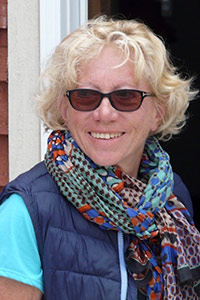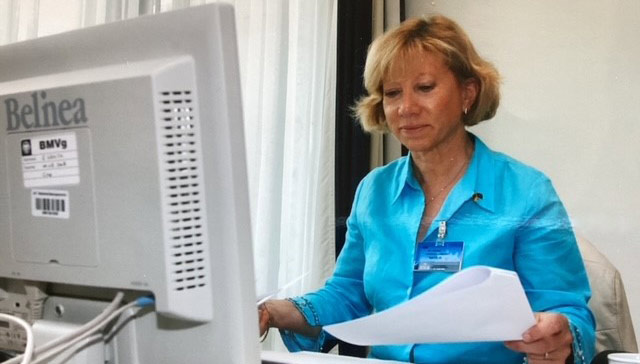During her long career at NATO, Hedwige Lauwaert served as the principal assistant to four NATO Spokespersons. In this behind-the-scenes role, she helped the Alliance communicate with thousands of international journalists – and witnessed turning points in NATO history, such as the accession of the first countries from the former Eastern Bloc in 1999, NATO’s operation Allied Force conducted in March 1999 to halt the humanitarian catastrophe that was then unfolding in Kosovo, and the invocation of Article 5 after the 9/11 terrorist attacks against the United States.
The journey to NATO’s press office
Hedwige was born in the Belgian city of Ninove in 1950, just a year after Belgium became a founding member of NATO. She studied modern languages and worked for 12 years in the private sector, for air transportation and engineering companies, before applying for a job at NATO Headquarters in Brussels.
Hedwige’s journey at NATO started in 1984, when she joined the International Military Staff at the Allied Long Lines Agency (ALLA). ALLA’s mission was to ensure telecommunication services in times of conflict and peace, and to provide support to NATO and the Allies in commercial procurement.
After one year of working in ALLA, Hedwige transferred to a new role in NATO’s Office of Information and Press, where she was part of the team in charge of organising visits to NATO Headquarters and offering group briefings to students, opinion makers, government officials and academics in English, French and Dutch. Additionally, she assisted the Dutch Liaison Officer in organising visits and conferences for groups from the Netherlands.
“When I worked in the Visits Section, I realised how important communication was for NATO’s image. It was a difficult time for the Alliance because of the protests against the storage of cruise missiles on European military bases in the 1980s and nuclear activism demonstrations, so when I was offered the position of personal assistant to soon-to-be Spokesperson Jamie Shea at the Press Office, I accepted it immediately.”
Working with the NATO Spokespersons
From 1995 to 2011, Hedwige served as the principal assistant to the NATO Spokesperson, working with Jamie Shea, Yves Brodeur, James Appathurai and Oana Lungescu. Hedwige’s main role was to organise interviews for the Spokesperson, the NATO Secretary General and other NATO officials with journalists and media outlets from all over the world, and to accompany the Spokesperson to NATO summits and ministerial meetings abroad.
During her sixteen years working for the NATO Spokesperson, Hedwige witnessed key episodes in the Alliance’s history. One particularly challenging moment was the Kosovo crisis in 1999. The pace of work was relentless, with daily press conferences, non-stop calls, long working hours and a considerable amount of stress as Spokesperson Jamie Shea explained NATO’s intervention over a 78-day air campaign to halt the humanitarian catastrophe.
“The Kosovo crisis was probably the most intense period of my career at NATO. Every day felt like a summit day. At the time, our offices were located in the entrance hall of the press building, and journalists would constantly approach us until a Media Operations Centre was created in the secure zone.”
Another key event of 1999 was NATO’s 50th anniversary summit in Washington, D.C. – where the North Atlantic Treaty had been signed in 1949.
“I remember this meeting as being quite historical, because the Heads of State and Government of the new NATO members – Czechia, Hungary and Poland – were participating in their first NATO summit meeting,” Hedwige recalls. “This was also the time when I first visited the CNN studios, where I met my media contact for many years to come.”
The 9/11 terrorist attacks were a turning point in NATO’s history. Hedwige remembers the moment she learned about the collapse of the World Trade Center in New York City and the never-ending night when the crisis team scrambled to understand what had happened, with no sustenance other than leftover birthday cake.
“Then-Spokesperson Yves Brodeur had just briefed a group of Finnish journalists when he returned to the office and told me to turn on the TV to see the images of the plane impact. Essential staff were required to stay working that night while all catering facilities were closed on the premises. It also happened to be the birthday of Jamie Shea, at the time the Director of Information and Press, and his cake was the only thing to eat all evening and night, and it had to be shared with approximately 20 people.”
Over the following days and weeks, Hedwige supported the Spokesperson and the Secretary General as they communicated NATO’s response to the world – including the invocation of Article 5 for the first time in NATO’s history.
During her time as contact point for international journalists, Hedwige learned about some of the professional difficulties they faced, particularly when it came to covering NATO’s meetings abroad. For this reason, on the occasion of the Foreign Ministers’ Meeting in Reykjavik in May 2002, Hedwige established a partnership with the Belgian Ministry of Defence that allowed her to use one of their planes as a means of transportation for journalists to such events. Hedwige’s creativity and innovation were commended by Secretary General Lord Robertson with NATO’s Award of Excellence, a recognition dedicated to honouring the professionalism of hard-working NATO staff members.
Life after NATO
Hedwige retired from NATO in 2011 and currently lives in Provence, France. She has become a keen gardener and helps to organise visits to the gardens in the region for the organisation ‘Mediterranean Gardening France’.

Hedwige Lauwaert’s message for the Alliance’s 75th anniversary
“It is probably a cliché, but I hope that NATO will be around for another 75 years, and longer, to make sure that future generations will live in peace.
There have always been difficult periods in NATO’s history, and frequently its relevance was put into question, but in the current hostile world, NATO is the only guarantee to stability and hopefully peace.”
This article is part of the 75th anniversary #WeAreNATO series.
These interviews feature former NATO staff members who share their personal stories and first-hand experiences related to the Alliance’s key moments and historic turning points, such as the Cold War and 1989, the first out-of-area missions, partnerships, 9/11 and more.
